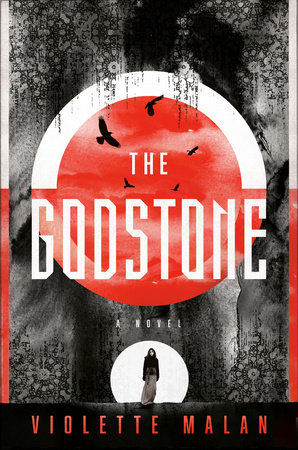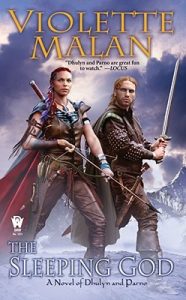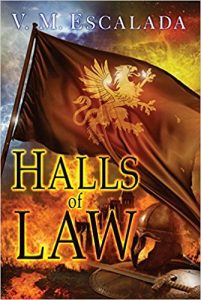 The Godstone by Violette Malan
The Godstone by Violette Malan Format: eARC
Source: supplied by publisher via Edelweiss
Formats available: hardcover, ebook
Genres: epic fantasy, fantasy
Pages: 304
Published by DAW Books on August 3, 2021
Purchasing Info: Author's Website, Publisher's Website, Amazon, Barnes & Noble, Kobo, Bookshop.org
Goodreads
This new epic fantasy series begins a tale of magic and danger, as a healer finds herself pulled deeper into a web of secrets and hazardous magic that could bring about the end of the world as she knows it.
Fenra Lowens has been a working Practitioner, using the magic of healing ever since she graduated from the White Court and left the City to live in the Outer Modes. When one of her patients, Arlyn Albainil, is summoned to the City to execute the final testament of a distant cousin, she agrees to help him. Arlyn suspects the White Court wants to access his cousin's Practitioner's vault. Arlyn can't ignore the summons: he knows the vault holds an artifact so dangerous he can't allow it to be freed.
Fenra quickly figures out that there is no cousin, that Arlyn himself is the missing Practitioner, the legendary Xandra Albainil, rumored to have made a Godstone with which he once almost destroyed the world. Sealing away the Godstone left Arlyn powerless and ill, and he needs Fenra to help him deal with the possibly sentient artifact before someone else finds and uses it.
Along the way they encounter Elvanyn Karamisk, an old friend whom Arlyn once betrayed. Convinced that Arlyn has not changed, and intends to use Fenra to recover the Godstone and with it all his power, Elvanyn joins them to keep Fenra safe and help her destroy the artifact.
My Review:
This is a first. I’ve never read a blurb for a book that managed to reveal too much AND say too little at the same time. It doesn’t really do a good job of describing or teasing the book at all, but still manages to reveal the thing that if it were in a review would be labelled a spoiler. ARRGGGHHH!
 So, this wasn’t quite what I was expecting, except in that this is an author I really enjoy (start her Dhulyn and Parno series with The Sleeping God or her more recent book, Halls of Law, written under V.M. Escalada but it’s still her.) So I was expecting a good reading time – and I certainly got that – I just didn’t get it quite the way I started out thinking I would.
So, this wasn’t quite what I was expecting, except in that this is an author I really enjoy (start her Dhulyn and Parno series with The Sleeping God or her more recent book, Halls of Law, written under V.M. Escalada but it’s still her.) So I was expecting a good reading time – and I certainly got that – I just didn’t get it quite the way I started out thinking I would.
This is one of those stories where it feels like you’re dropped in the middle. Which can be a good thing, because it makes the world and the characters seem fully formed from the very beginning. On the other hand, because no one is getting introduced to this world or coming of age in this story we don’t get the explanations that help ground readers into a new world.
It’s more like an immersive language course. The language, after all, already exists and is fully formed when the student begins the class. The newbie is then in a sink or swim situation to get up to speed as soon as possible.
So it is in The Godstone. As the story begins, we’re in a small village out in the hinterlands somewhere. Far from the capital, which is just how both Arlyn Albainil and Fenra Lowens like it. Arlyn is a world-renowned furniture maker, and Fenra is the village healer. Arlyn is also Fenra’s long-term patient, as he suffers from what we would call periodic bouts of severe depression.
Both characters are well into adulthood when we meet them, even if Arlyn is a whole lot further into adulthood than anyone – including his healer – could possibly imagine. They are who they are going to be. What makes them interesting is that they are not exactly who they appear to be, and especially not precisely who they have told each other they are.
The Godstone is an adventure story. And a quest. And a story about being forced to dismantle a comfortable persona in order to do what desperately needs to be done.
Which just so happens to turn out to be saving the world.
Escape Rating A-: This turned out to be an absorbing little world, and a surprisingly compelling story, in spite of the fact that I a)knew way too much from the blurb going in and b)went down a rabbit hole of my own making and couldn’t get myself out. Only to eventually realize that the rabbit hole was not quite as much of a wild goose chase as I originally thought.
And that many of my assumptions about the way that things work here, based on what they remind me of, may be considerably more off-base than that rabbit hole that sorta/kinda wasn’t.
 The story at first seems straightforward enough, in a sense, because it’s obvious to Arlyn from the very beginning that there are some seriously screwy political shenanigans going on in the capital that someone wants to entangle him in. So even though the political shenanigans themselves are more convoluted and dangerous than first appears – because of course they are – that initial framework itself is easy to understand.
The story at first seems straightforward enough, in a sense, because it’s obvious to Arlyn from the very beginning that there are some seriously screwy political shenanigans going on in the capital that someone wants to entangle him in. So even though the political shenanigans themselves are more convoluted and dangerous than first appears – because of course they are – that initial framework itself is easy to understand.
Arlyn knows that his summons to the capital is not exactly on the up and up because he’s being summoned as the nearest relative of a powerful practitioner (read as magic-user). He knows it’s not legit because he himself is the supposedly dead practitioner he’s been pretending to be the relative of for, let’s say, lo these many years.
Fenra, who is the local practitioner in their remote village, assumes its not totally legit because the rise of political shenanigans in the capital was the reason she decided to set up her practice in a remote village in the first place. Paraphrasing Shakespeare a bit, because this story made me borrow bits from pretty much everywhere – It’s Denmark, and the state of the place is rotten and getting rottener by the year. Fenra doesn’t want her patient getting caught up in someone else’s game of political or magical one-upmanship, whoever and whatever it might be.
The exact nature of Arlyn’s illness – or at least how he became ill – is suddenly and perpetually relevant. Arlyn has periodic bouts of what appears to be a deep depression. Fenra is able to level him out so he can be functional – and also not waste away into nothingness – but she can’t cure him.
What makes Arlyn’s illness so fascinating, and what turns out to be the central puzzle of the whole story, is how he got that way. Once upon a time, the practitioner he used to be created an artifact that could literally destroy the world. He couldn’t destroy the artifact or at least not without potentially doing the thing he didn’t want to do in the first place, i.e. destroying the world that he himself was living on, so he locked it away where it could never be found. Except, of course, it has been, hence the original not-exactly-legit summons.
Arlyn thought that when he locked away the artifact, the Godstone, he lost his power in the locking away. Instead, he split himself in two, kind of like the episodes of Star Trek where Captain Kirk splits into good and evil twins. So there are two Arlyns, and both of them are telling their bits of the story in the first person, as are Fenra and Arlyn’s long-lost – seriously lost – friend, Elvanyn.
I found myself following the story by using equivalences. The Modes, the different neighborhoods, or counties or villages, seemed to be like the Shards of Marie Brennan’s Driftwood. Not quite, but close enough. Political skullduggery is it’s own mess, but the forms it takes tend to be similar, and so it seems here. Arlyn’s personality split echoes that Star Trek scenario, as what he’s divided into are a half with knowledge but no power, and one with power but no knowledge. Arlyn is actually a fairly decent person, while his other half, Xandra, has all of his power and all the arrogance that goes with it, but none of Arlyn’s wisdom or empathy to temper it.
Arlyn was a bit of a puzzle because his name echoes a character in, of all things, Final Fantasy XV. I kept mentally equating Arlyn Arbainil with Ardyn Izunia. Then I thought I’d fallen down a rabbit hole, then I decided that there was more carryover than I first thought, and not just because both characters are considerably older than they appear. Also much more of a psychological mess than they first appear. And while Arlyn is not as nasty as Ardyn, his long-buried counterpart, Xandra, certainly is.
So there’s a lot to process in this one. I enjoyed the hell out of it, even the times I was a bit confused. The round-robin of first-person narratives got a bit confusing with both Arlyn and the other Arlyn telling their parts of the story under the same name, but they were so opposite to each other that it didn’t take too long to get back on track.
There are still so many things about this world I don’t know, things that occasionally got a bit in my way but never for long. I loved that the other two voices were so distinct, and that Fenra was keeping just as many secrets as Arlyn – even if hers were not nearly as world-shattering. Although, come to think of it, they could be if this turns out to be the first book in a series after all. The Godstone didn’t end in a way that felt like it led to more adventures in this world, but it could.
I certainly had a more than good enough reading time that I’d sign up for the sequel – right this minute if I knew where to sign!
